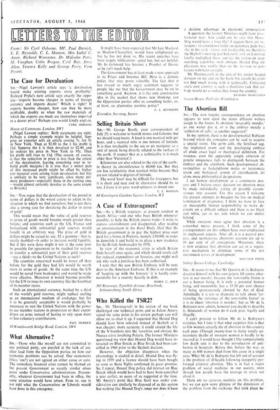The Case for Devaluation EN g
.-I
O From : Sir Cyril Osborne, MP, Paul Derrick, E. E. Reynolds, C. L. Manton, Mrs Isabel C. Amer, Richard Worcester, Dr Malcolm Potts, M. Vaughan, Colm Brogan, Cyril Ray, terry Allen, Terence Kelly and George Perry, Vera Bryant.
SIR,—Nigel Lawson's article says 'a devaluation would make existing exports more profitable.' Richard Pryke's next article says exactly the oppo- site—'exports become cheaper in terms of foreign currency and imports dearer.' Which is right? If exports become cheaper, how can they be more profitable, doubly so when the raw materials of which the exports are made are themselves imported at a dearer price? Perhaps you would kindly explain.
CYRIL OSBORNE House of Commons, London, SW 1
[Nigel Lawson replies: Both statements are right. Perhaps a simple example might be helpful. Sup- pose an exporter sells an article costing 7s. for $1 in New York. Then at $2.80 to the £ his profit is lid. Suppose the £ is then devalued to $2.40. and he reduces his price in New York to 95c. Then his profit still rises to I Id. (The reason, of course, is that the reduction in price is less than the extent of the devaluation, leaving something over to re- build profit margins.) It is true that a minor part of this increased profit might be offset by higher raw material costs arising from devaluation, but this is unlikely to be very significant, since many pri- mary producers—especially those in the sterling area —would almost certainly devalue to the same extent as Britain.]





























 Previous page
Previous page